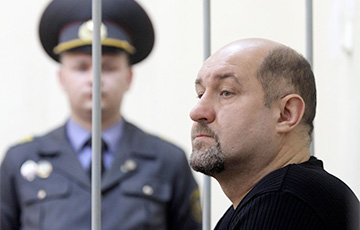Dzmitry Bandarenka: Nobody Can Forbid Us To Be Decent People
4- 29.07.2023, 22:42
- 8,548

Horizontal ties can help political prisoners and their families.
Why is the experience of Polish Solidarity important for Belarusians? How can people in Belarus help political prisoners and their families? What support do prisoners of conscience lack?
The Charter97.org website talked about this with coordinator of the European Belarus civil campaign, former political prisoner Dzmitry Bandarenka.
— What does the word “solidarity” mean to you?
— I want to say that the word “solidarity” is very closely connected with Poland. The world-famous Solidarity trade union had a huge impact on the fall of communism in the USSR and the countries of the so-called socialist camp.
Poland, its citizens, organizations and media have always been in solidarity with the Belarusians before 2010, and after that, and now. I can say that for my family, Polish solidarity is not just beautiful words. I remember how a lawyer brought me a printout from Gazeta Wyborcza, which contained an interview with my daughter. It really supported and inspired me.
Now there is a system of “godparents” of political prisoners. It all started back in 2010. My “godfather” was Polish MEP Marek Migalski. He did a lot: he wrote letters to the heads of prisons, colonies.
He demanded that I be provided with medical assistance, helped my family. Marek Migalski initiated my nomination for the Andrei Sakharov Prize in 2011.
When I got out of prison, he invited me to a conference organized in the European Parliament. Marek Migalski is an exemplary “godfather” who acted very effectively.
I can also say that in 2012, activists of the then opposition party PIS (Law and Justice) organized my treatment in one of the hospitals in Poland.
I would also note the assistance of the Polish government to human rights organizations and, of course, the Kastus Kalinouski student program.
By the way, I myself was among the participants in the Kalinouski program, because after 2010, not only repressed students and active Belarusian youth had the right to study under this program. As part of this program, I received a postgraduate education at the University of Warsaw. Education was at a very high level. Here is a concrete manifestation of Polish assistance.
Now Poland does more for Belarusians and the Belarusian repressed than other countries of the world.
— How can you help political prisoners today?
— There are a huge number of organizations affiliated with Tsikhanouskaya’s office, but for some reason, very often Belarusians turn to me and my colleagues, complaining about the lack of any support from organizations created to help the repressed citizens of Belarus.
This situation is incomprehensible, because people who pretend to be “representatives of the Belarusian people” travel around the world, meet with prime ministers and presidents at the highest level, and are not able to resolve the issue of helping specific people. This is our reality.
Indeed, it is necessary to help specific political prisoners both in Belarus (who have such an opportunity), and the former repressed who ended up abroad. There are always those who need help first. Often these are pensioners, people who can no longer work for health reasons, families with children.
It is necessary to demand specific assistance from the so-called representatives of democratic Belarus, who love to travel. After all, it is them, I emphasize, who meet with world politicians of a very high rank.
For example, Tsikhanouskaya recently visited Italy. I know that the Italians helped the children and families of the victims of the Chernobyl disaster very seriously.
It was quite possible to resolve with the Prime Minister, with members of the Cabinet of Ministers of Italy, the issue of rehabilitating the prisoners who had served their sentences, and helping their families. There are Italian organizations that have helped Belarusians before.
— How can a simple person who is in Belarus help political prisoners?
— It seems to me that due to the scale of repressions in the country, many Belarusians know some people who have suffered and who need support today.
It can be your neighbors, relatives, classmates. Such assistance would not cause any reaction from the authorities, because people communicate by themselves. It doesn't strike the eye. You just need to help.
When I was in jail, my wife bought goods for the parcels, and the people who found out who it was helped her for free.
There were friends, acquaintances who came and said: “Listen, here is 100 dollars, this is to support your husband.” This horizontal is very important.
I will cite, again, the experience of the underground Polish Solidarity. They said that it was not political ties that were the strongest, but the help of relatives, friends, neighbors who adhered to approximately the same views, but were not seriously involved in politics. As a movie character once said: “No one can forbid us to be decent people”.









